Total Recall Set Visit Interview: Director Len Wiseman And Producer Toby Jaffe
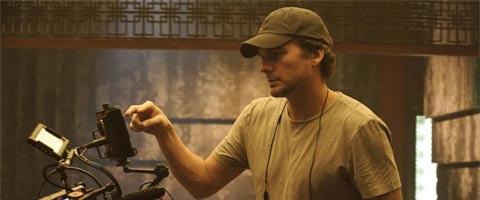
Paul Verhoeven’s Total Recall is seen by many as one of the best examples of modern science-fiction. Released in 1990, the film mixed classic sci-fi elements with great world building, plenty of action, and a lot of fun. Because of the original’s popularity, however, there are many eyes looking at director Len Wiseman and producer Toby Jaffe, who will be releasing their own version of Total Recall this August, and last summer I and a small group of other journalists had the chance to speak with them on set about it.
As reported earlier in the day, last summer I was invited to go to Toronto, Canada to visit the set of the upcoming Total Recall and in between scenes we had the chance to sit down and speak with Wiseman and Jaffe about the project. Check out our chat below in which the filmmakers discuss going back to the book, the parable between their new world and our own, and maintaining the mystery of whether or not it’s all a dream.
How are you capturing your futuristic look?
Wiseman: In many ways. Lens flare is a detail… it actually helps, and I’ve seen this now, looking at it now — and I didn’t actually create that — it sometimes can help make a really grungy environment seem slightly futuristic. If you’re in a lot of our New Asia environments, more of our seedy environments, a little bit of lens flare gives it a bit of a modern feel. And it works well for visual effects. You can hide a lot.
The first movie is very much an Arnold movie. This one seems to be more of an ensemble, much bigger roles. Something attacked from day one? Make this a bigger project?
Wiseman: Not with a goal of it being a bigger project in terms of the character regard. A lot of characters are there —
Toby Jaffe: I just think it was a conscious choice for the Laurie character to kind of incorporate the real estate that the Richter character occupied in the original film, so that we can have a more central character who really goes through the whole movie from the beginning to end as a villain.
CINEMABLEND NEWSLETTER
Your Daily Blend of Entertainment News
The original Total Recall was a 90s film that looked at a lot of societal issues. What societal issues in this movie?
Jaffe: I think it’s similar, but more grounded. We don’t go to Mars in this film. So we’re dealing with a more relatable class issue of haves and have nots, workers and the wealthy class. And that’s the kind of dynamic that we’re into. Classic working class people against the wealthy who control the real estate, and want to control the real estate of the planet.
Wiseman: And the propaganda machine, which is always current.
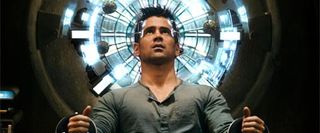
Will we see the rebellion of New Asia?
Wiseman: There is the resistance, and then also these federal police. The federal police patrol interactive in New Asia. But yes, there’s a resistance group that has their whole force.
One of the things about Total Recall—how much are you playing, “Is it real? Is it in head?” Will ending be clear?
Wiseman: I can only take it from how I would leave a movie like this. There’s going to be a lot of speculation. I would think — I would hope! — some people are going to absolutely think one way, and because of certain details that I’m putting in there, [certain people] may think the other. It is something that I love: the continued conversation about it.
Jaffe: I think it’s great fun for the audience to be able to argue about what their version of the movie was when they go home afterwards or go out to dinner, or whatever.
How much influence did the original Philip K. Dick story have in the reimagining?
Wiseman: Huge. For me, that’s where it really started. The impetus to do it was based on picking up the short story, reading it, and saying, “Wow, it would be great to do this.” And that started a chain of events of trying to figure out who had the rights and how do we get them. When we started with Kurt Wimmer, it was really about the story. And, actually, we sort of came to the movie secondarily, because there is a great structure to that screenplay. But as you can see, from what you’ve seen today, the world creation and the tone is really completely different from that earlier film.
Do you think there are elements of that story that have carried over that weren’t present in that earlier movie?
Wiseman: I think, on a character level, more so. Yeah, absolutely. I think the characters are truer to the story.
In fight scene, it seemed like there was a little of gun kata from Kurt’s Equilibrium. Did you consult with him for fighting styles?
Wiseman: There’s not really any… that wasn’t very specific.
Jaffe: That was really a Len design.
Wiseman: Yeah. He’s shooting guys. I really like what Kurt did with that. But it was more of shooting, and actually using it as a weapon, almost like a punch. But no, this was also something I wanted to put together, just to see if it could actually work as an emotion of going through a whole experience of this guy who has this ability, but we never really take a breath until it’s over. And to accomplish that with all the tools we have.
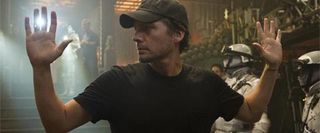
Why New Asia? Why not New Rhineland, or New Deutschland, or New Africa?
Wiseman: We didn’t have this conversation before. Maybe I would have.
Is there other world building, or just two sides of the shaft?
Wiseman: It really deals with the two sides, because a lot of the rest of the world is uninhabitable.
Jaffe: There is some reference to what happened and to the rest of the world, but that’s a kind of fun reveal in the movie.
How difficult is it handling the exposition, seeing as you are introducing audiences to a whole new world?
Wiseman: It’s always tricky, because you want to have it come across naturally, and obviously there’s a lot that has to be told. I think the script does a really good job at that. It’s a combination of script and then, visually, how you sell a lot of those ideas. Hopefully you don’t have to talk through all of them, and you can show them.
Kind of piggybacking off all this talk about building this new world, something that is very unique, and has a lot of information that goes along with it, is this version of Total Recall a succinct adventure story that has a definitive end? Is there possibility for other stories, whereas with the first movie, obviously, that was the end?
Wiseman: I’ve always thought, from the original story, there definitely is because of the nature of what this is. The movie Total Recall, or Recall itself, it’s offering an experience, a journey. Whether it be Mars, or whatever the location is. I think the nature of what the overall cool concept is does allow for that kind of that kind of thing. We haven’t actually given it thought.
Does the script allow for that? Does this movie allow for that?
Wiseman: Not overtly.
Right. It’s not like, “Here’s Number Two!”
Wiseman: Yeah. It’s not a like we end with a tee-up. Really, we just want to make a good movie. We’re hoping that it ends with a feeling of great satisfaction, and posing a question to you as an audience member: What do you want to believe that this movie is? Did it really happen, or didn’t it really happen? And that’s what we want to get to, because I think that’s what’s fun for the audience. Give them a really satisfying experience, something to talk about. Hopefully it works, and then we can sort of figure out where to from here.
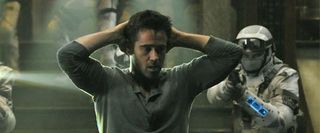
Of everything we’ve seen today, this is definitely its own beast. But with a beloved film like this, there are diehard fans. Do you feel obligated to include an Easter Egg for people who love the original? Worried that will take people out of the movie?
Wiseman: It’s on my mind, but it’s on my mind in a way that I don’t think you can stress about it too much. Some people will always be disappointed. It’s inherent with any kind of new adaptation, or a remake, there are going to be people who love the original. There’s always going to be an element to that. Because I’m a fan of the original, I really just go from my own perspective in terms of that. There are things in there that, coming from a 16 year-old experience of it that I wanted to carry through. But I really just approach it from being a fan myself. You just do the best you can do.
Kate [Beckinsale] has a phone embedded in her hand and we’ve heard about a bunch of other cool little bits of science-fiction. What are you excited for audiences to see?
Wiseman: There is so much great stuff. There’s a lot of new technologies, and advancements, and toys. Just like you saw in the little bit of what we showed with the shrapnel cameras, I’m always trying to think up new stuff that you haven’t seen in other places. Because it’s the future. You’re expecting to see some really fun, cool gadgets and things.
Jaffe: There’s the whole transportation system. And just the whole concept of in the future, in a lot of futuristic movies, you see a completely reimagined world that doesn’t look anything like our world today. I think one of the great takes that Len brought to it is, as the world changes, there’s still a baseline of our reality today. Just like if you go to an old city, you see buildings that have been there for hundreds and hundreds of years next to a modern skyscraper. So the idea that you can see the 20th Century world on one level, and the 23rd Century world or the 24th Century world above it and above it, and you can see history as you travel down in a city that’s built upon a city upon a city, is a cool concept.
Wiseman: And it’s something that has never really made sense to me. If you go a hundred years in the future, they don’t just get rid of everything we have and put it in a big, large world storage. It’s going to exist, like Toby’s saying, in layers.
Jaffe: There are still cobblestone streets in every city you go into, only now we have freeways.
Wiseman: So, a base level is still relatively familiar. Buildings have been around. So, we’re going with that theory to create the world so it has a realism to it.
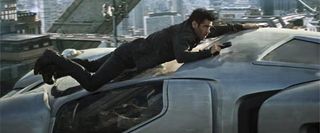
Did you guys come up with the final year that this movie takes place?
Wiseman: We don’t have a year.
Jaffe: We’ve never really pinned it down.
A century?
Wiseman: …
Jaffe: …
It’s in the future!
Everyone: IN THE FUTURE!
Wiseman: You always hear talk about “a hundred years in the future.” When you think about… for me, it’s really driven by the elevator through the core of the Earth. That’s not something that’s going to happen in fifty years. Maybe something that happens in a hundred years. In my own head.
Jaffe: And in how built out the world is, and how long it actually takes. It’s no longer a world where it has to expand. It expanded already. It’s about building on top, and above, and stacked and stacked. And how long that would actually take. That kind of forms a general sense of how far in the future we are. But there’s no number tagged on it.
You guys are really grounding this in reality. I’m curious how you guys are making way for humor. A lot of the original had a lot of great classic one liners and humors in it.
Jaffe: To me, grounded and real doesn’t mean no humor. In real life, there’s humor. So, I think grounded does not mean no fun. It just means it’s not played for tongue in cheek.
Wiseman: I think one of the big draws for us to have Colin Farrell in the movie, he is a very grounded, real actor, who brings his own kind of energy. If you’ve seen some of his movies, he can be a very funny guy, but he’s always doing it from a real place of character, and honesty for that character. So he’s bringing humor to it, but in a way that I think feels more real than zingers and one-liners.
Is this PG-13?
Wiseman: Yes.
Did you keep any classic one-liners?
Wiseman: There are spins on some of the ones that I remember when I first saw it. We have our different twists on stuff.
Jaffe: I didn’t want to repeat anything that [Paul] Verhoeven has done.
Wiseman: When you were asking the question about keeping things from the original: as fans, there are little references here and there that if you’ve seen a movie, you’ll say, “Oh, I know where that comes from.” The way you turn a line around into a new version around, or that sort of thing.

Eric Eisenberg is the Assistant Managing Editor at CinemaBlend. After graduating Boston University and earning a bachelor’s degree in journalism, he took a part-time job as a staff writer for CinemaBlend, and after six months was offered the opportunity to move to Los Angeles and take on a newly created West Coast Editor position. Over a decade later, he's continuing to advance his interests and expertise. In addition to conducting filmmaker interviews and contributing to the news and feature content of the site, Eric also oversees the Movie Reviews section, writes the the weekend box office report (published Sundays), and is the site's resident Stephen King expert. He has two King-related columns.
Most Popular





